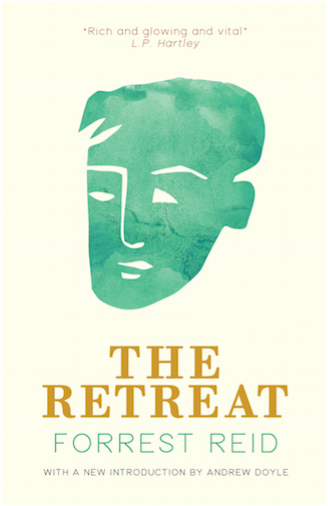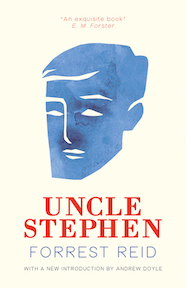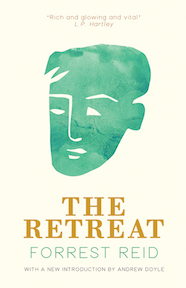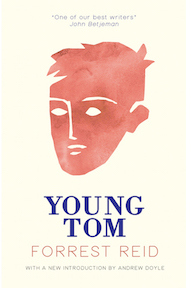|
BOOK DETAILS
Trade paper ISBN-13: 978-1941147511 List Price: $16.99 U.S. Pages: 232. Published: 2015 |
The Retreat (1936)
Forrest Reid With a new introduction by Andrew Doyle the tom barber trilogyBook Description
The Retreat opens with a vivid dream about an evil sorcerer and his boy apprentice. The dreamer is Tom Barber, age 13, who, like many intelligent and sensitive children, moves between the world of everyday life and that of the imagination. “I pretend things, and all at once they become real,” Tom says, and they become real for the reader as well, as we follow him over the course of one summer during which the lines between reality and fantasy are frequently blurred. In his depiction of Tom’s fantastic adventures in an unseen world – his attempts to thwart the malign influence of the cat Henry, whom he has observed scratching cabbalistic symbols on the gravel path; his meetings with the beautiful boy-angel Gamelyn; his conversations with animals; his experiences in the Garden of Eden – Forrest Reid’s delicate artistry is at its finest and most delightful. The second of Reid’s three novels featuring Tom Barber, The Retreat earned universal critical acclaim when first published in 1936. This edition includes a new introduction by Andrew Doyle and numerous never-before-published photographs and illustrations. |
“He writes with such ease and simplicity, his stories, always unusual, are so exquisitely told, and when, as often happens, he takes you into regions not too far distant from fairyland, he has only to wave his wand to make you believe.” – Ralph Straus, Sunday Times
“[An] eerie, unusual, quite enchanting book.” – Guardian
“A book of fine and haunting quality.” – Dublin Magazine
“He has a simple story to tell, but he tells it with the fastidious craftsmanship of a Flaubert or a Turgenev, and because it is told supremely well it lives in the memory long after more strident dramas have been forgotten. . . . [The Retreat] is a book which everyone who has not wholly lost touch with his youth will be certain to enjoy.” – Irish Independent
“Mr. Reid is one of the most remarkable living fantasists . . . [A]t once charming and a psychological tour de force.” – London Mercury
“[An] eerie, unusual, quite enchanting book.” – Guardian
“A book of fine and haunting quality.” – Dublin Magazine
“He has a simple story to tell, but he tells it with the fastidious craftsmanship of a Flaubert or a Turgenev, and because it is told supremely well it lives in the memory long after more strident dramas have been forgotten. . . . [The Retreat] is a book which everyone who has not wholly lost touch with his youth will be certain to enjoy.” – Irish Independent
“Mr. Reid is one of the most remarkable living fantasists . . . [A]t once charming and a psychological tour de force.” – London Mercury
AUTHOR BIOGRAPHY
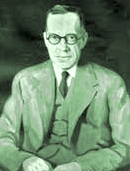
Forrest Reid was born in Belfast in 1875, the youngest of a large family. His father died when he was still a young child, and much of his upbringing therefore fell to his rather conventional mother and his elder sisters. As a youth he felt ill at ease with what seemed the narrow piety of his family’s Presbyterian faith, and their solid middle-class values. After a local schooling, he was apprenticed at age eighteen to the tea trade. The work was not demanding, and Reid coped with the tedium of commercial life by retreating into a dream world of wonder and beauty, inspired by his reading of the Greek classics.
Reid later disowned his first two novels, The Kingdom of Twilight (1904) and The Garden God (1905). The latter novel risked controversy with its portrayal of romantic friendship between two boys; Reid dedicated it to his literary idol Henry James, who was outraged and never spoke to Reid again. After the death of Reid’s mother, a small legacy enabled him to devote himself more fully to his writing, and in the 1910s he published a string of excellent, though not commercially successful novels, including The Bracknels (1911), Following Darkness (1912) (said to have been an influence on Joyce’s A Portrait of the Artist as a Young Man), At the Door of the Gate (1915), The Spring Song (1916), and Pirates of the Spring (1919).
The best of Reid’s works, though, came later in life, beginning with Uncle Stephen (1931), which, with The Retreat (1936) and Young Tom (1944), made up the Tom Barber trilogy, regarded by many as his masterpiece; the final book in the trilogy won the James Tait Black Memorial Prize as the best novel published in 1944. Reid’s other mature work includes Brian Westby (1934), inspired by Reid’s friendship with nineteen-year-old Stephen Gilbert, who also went on to become a novelist, and Peter Waring (1937) and Denis Bracknel (1947), rewritten versions of Following Darkness and The Bracknels, respectively. Reid died in 1947, critically well-regarded, but never having achieved the widespread popular recognition he deserved. When Valancourt Books reprinted The Garden God in 2007, all of Reid’s books were out of print. Valancourt is now in the process of restoring Reid’s best works to print.
Reid later disowned his first two novels, The Kingdom of Twilight (1904) and The Garden God (1905). The latter novel risked controversy with its portrayal of romantic friendship between two boys; Reid dedicated it to his literary idol Henry James, who was outraged and never spoke to Reid again. After the death of Reid’s mother, a small legacy enabled him to devote himself more fully to his writing, and in the 1910s he published a string of excellent, though not commercially successful novels, including The Bracknels (1911), Following Darkness (1912) (said to have been an influence on Joyce’s A Portrait of the Artist as a Young Man), At the Door of the Gate (1915), The Spring Song (1916), and Pirates of the Spring (1919).
The best of Reid’s works, though, came later in life, beginning with Uncle Stephen (1931), which, with The Retreat (1936) and Young Tom (1944), made up the Tom Barber trilogy, regarded by many as his masterpiece; the final book in the trilogy won the James Tait Black Memorial Prize as the best novel published in 1944. Reid’s other mature work includes Brian Westby (1934), inspired by Reid’s friendship with nineteen-year-old Stephen Gilbert, who also went on to become a novelist, and Peter Waring (1937) and Denis Bracknel (1947), rewritten versions of Following Darkness and The Bracknels, respectively. Reid died in 1947, critically well-regarded, but never having achieved the widespread popular recognition he deserved. When Valancourt Books reprinted The Garden God in 2007, all of Reid’s books were out of print. Valancourt is now in the process of restoring Reid’s best works to print.

